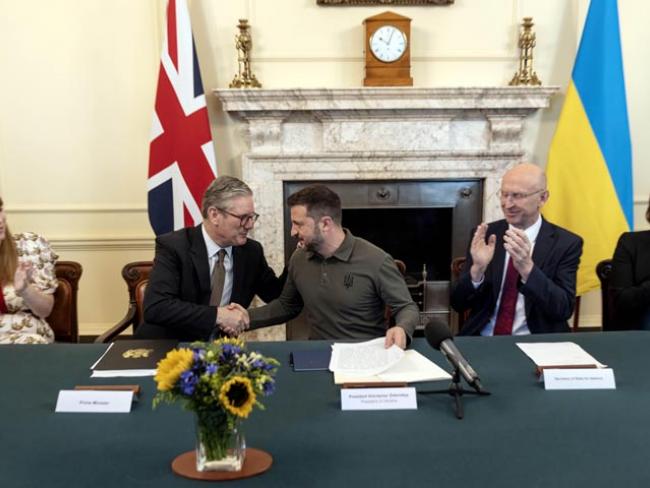
Ukraine president Volodymyr Zelensky with Keir Starmer in Downing Street, 19 July. Starmer promised backing “today and always”. Photo PA Images/Alamy Stock Photo.
The war between Ukraine and Russia has escalated with little sign of resolution…
The advance by Ukraine into the Kursk region of Russia marks a new step in the fighting, ongoing since the Russian invasion in February 2022.
Successive British governments have backed Ukraine unreservedly and feted its president, Volodymyr Zelensky. They have also encouraged Ukraine to hold out against a peace deal and continue fighting.
Above all else they have opened the door to Ukraine joining NATO – a course specifically endorsed by the incoming Labour government. The threat of NATO expansion and the aim of the Ukrainian government to join the military alliance have been sources of conflict with Russia for over a decade.
The new prime minister Keir Starmer quickly committed Britain to continue military assistance “for as long as it takes” – in addition to the aid already provided – a total of £12.7 billion, including £3 billion planned for this year.
Britain has trained Ukrainian armed forces and supplied weapons. This has now escalated with Ukraine’s use of Challenger 2 tanks – “gifted” by Britain – in their attack into Russia. Agreement was given for the use of weapons supplied by Britain inside Russia in June, but this is the first time they have actually been deployed.
The government and the defence ministry say that there is no change in policy and that Ukraine has “a clear right” to use those weapons in self-defence, including action inside Russia. That completely overlooks the inexorable shift in British involvement, becoming more entangled in the conflict at every step.
Further entanglement is threatened by Zelensky’s expressed desire for Ukraine to use Britain’s Storm Shadow long range missile. In late July Starmer appeared to accede to this demand, but the defence ministry quickly announced that nothing had changed. But why supply them at all and ramp up production if they are not to be used at some point?
NATO – with the US and Britain in the lead – has seen invasion as an opportunity to intensify its opposition to Russia. And the EU seeks to use the war to further its failing mission of centralisation and control.
NATO describes Ukraine’s action as self-defence by “an independent, peaceful and democratic country” against an unprovoked attack. This completely ignores the US interference in the region during the time between the break-up of the Soviet Union and the current Ukraine government coming to power. That was far from peaceful and democratic.
Conscription
And Ukraine with a conscription crisis is hardly independent when its war aims depend on bringing NATO countries directly into the conflict. Its counter attack in Kursk isn’t an attempt to invade the whole of Russia. Nor will it drive Russian troops out of Ukraine’s territory – Russia is making gains in the Donetsk region.
But there isn’t any sign that the offensive is designed to bring Russia into peace talks.
Zelensky sent his foreign minister Dmytro Kuleba to China on 24 July, the first visit to China by any senior Ukrainian figure since the war started. This followed the summit held in June in Switzerland at Zelensky’s behest excluding Russia – which China declined to attend. The visit appeared to be merely an attempt to persuade China to attend the next summit while continuing to exclude Russia.
Starmer and his ministers forget about financial black holes when it comes to warmongering. British workers could help by forcing the government to use the resources allocated to war at home instead, where they are badly needed – in education, social care and the NHS for starters. That would also be a great contribution to peace.
